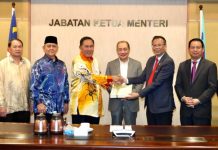PUTRAJAYA: Warisan President Shafie Apdal’s recent insinuation on creating two new ministries if the Warisan Plus coalition is returned to power in the 16th State Election is not only awkward but unbecoming of a caretaker Chief Minister who had hurriedly and improperly advised the TYT for the Sabah State Legislative Assembly dissolved on 30th July 2020.
These statements are especially intriguing as barely a week or so before the dissolution of the Sabah State Assembly, Shafie had confidently declared that he had the support of more than two-third members of the Sabah State Legislative Assembly. In reality, he had lost majority support and is required to resign as the Chief Minister and did not have the legal authority to advise the TYT to dissolve the Assembly.
What is puzzling is that he had more or less 26 months to restructure and refocus his administration. This Shafie failed to carry out and it is common knowledge to the majority of Sabahans that he has failed to manage Sabah properly and creating a big mess out of the economy
Shafie also curiously highlighted that after the Warisan coalition took over the State Government in 2018, three ministries were restructured and renamed with additional new staff. The ministries are the Education and Innovation Ministry, the Health and People’s Wellbeing Ministry and the Law and Native Affairs Ministry.
What then led Shafie to suddenly realise that he needs two more new ministries? A more pertinent question is, what are the performances of the newly minted ministries? What have they been doing?
Would it not be just a plain waste of money, if these ministries’ performance were lackluster? Were the Ministers and Assistants getting “gaji buta”?
Yet, Shafie is still contemplating two more new ministries. Why should ordinary Sabahans believe him on the proposed new ministries?
The people of Sabah are confused because the Warisan-led government claims the previous government left the State in dire straits but yet the caretaker Chief Minister wishes to set up two more ministries, a feat that will incur substantial expenditure, administrative costs and emoluments.
This grand plan seems ridiculous considering the failure of the Sabah government in managing its financial affairs and the management of the administration.
Yayasan Sabah is struggling to resolve the salary woes of University College Sabah Foundation and Kolej Yayasan Teknikal Sabah’s staff. This came after the financial debacle in SAC3 where staff were not paid for months. Despite Shafie’s instruction to the State Secretary to resolve UCSF financial problem, UCSF staff had been complaining that they have yet to receive their promised salaries.
Shafie was quoted as saying, ““I will restructure the administration of the ministries (in Sabah). There will be two more new ministries…. Each ministry should have its own focus so that the state would be able to administer its wealth better.”
“What has Shafie being doing the last 26 months before its dissolution? Was he and his colleagues sleeping on the job?”
Perhaps he came to a sudden realisation that his administration needs to be more focused “to administer its wealth better” because the stark reality is his administration had made a mess of the state government policies and programs.
His government is unable to even formulate and implement policies that are supportive of the investment climate. In short, Shafie as the de facto Chief Minister cum Finance Minister had failed to provide the much needed economic leadership.
He had pursued with vengeance replacing CEOs and heads of department and agencies who were deemed supportive of the previous BN government with “his own people.
His government even appointed officers, the Director of the Waterworks Department in particular, in breach of the laws of Sabah, and wrongfully terminated many contracts resulting in the Government being sued for hundreds of million ringgit.
This move had left the state government with less experienced officers. Many officers had no previous experience for example in development planning and project implementation.
The Warisan-led Government is also led by inexperienced ministers and officers in investment promotion, evaluation and implementation.
The reality is, Shafie Apdal’s and his Warisan government had devastated Sabah’s economy after only 26 months in power. This year, the state’s GDP is projected to record a negative growth, purportedly due to the Covid-19 pandemic. In reality, even without the Covid-19 pandemic, Sabah’s GDP would probably have recorded a negative growth.
Such forecast was made based on the trend shown by Sabah’s GDP growth that continued to drop drastically ever since Warisan became the state government. In 2017, the state’s GDP was the highest among all states in Malaysia at 8.2%.
But after the first year of Warisan’s administration in 2018, the figure plunged downward to 1.5%, and almost grounded to a halt at 0.5% a year later. And for two consecutive years, Sabah has become the sick man of Malaysia, with its GDP registering the lowest GDP growth among all states in Malaysia, and unemployment recorded at 5.8% for 2018-2019, the highest in two decades.
This happened before the start of Covid-19 pandemic.
During these two years also, the price of crude oil, a commodity Sabah is highly dependent on, was higher than in 2017 when the commodity’s prices were suffering a downtrend. With the higher oil price and record oil royalties of more RM3.2 billion over the 2 years, Sabah’s GDP should have been higher than the 8.2% in 2017.
Suddenly, Shafie must have come to his senses that, he might lose the support of Sabahans, especially the urban voters who have lost their jobs and suffered untold damages.
Businesses had almost grounded resulting in business hardships, staring at the prospects of business closures and bankruptcies.
The Warisan-led Sabah State Government is plainly incompetent in handling economic management and have caused Sabah and Sabahans untold misery.
Shafie had rounded up public-listed companies and GLCs to promote investments, but nothing happened. Billions of Ringgit of investments were announced but nothing happened, only production of cooking oil, which could be taken up by SMEs with the right incentives. In reality, it was actually not a cooking oil production factory but merely a packing plant to bottle cooking oil already produced by other palm oil refineries.
It was just a cheap publicity stunt to announce production of cooking oil when it was merely packing and bottling cooking oil already produced by others. The Warisan-led government should not be beating its own chest when it has only a GLC packing and bottling cooking oil to show for the last 26 months and without actually producing the cooking oil.-
Datuk Dr. Jeffrey Kitingan
President STAR Sabah
Deputy Minister of Tourism, Arts and Culture of Malaysia






